
The Fortunes and Misfortunes of the Famous Moll Flanders, &c. Who was Born in Newgate, and during a Life of continu'd Variety for Threescore Years, besides her Childhood, was Twelve Year a Whore, five times a Wife (whereof once to her own Brother), Twelve Year a Thief, Eight Year a Transported Felon in Virginia, at last grew Rich, liv'd Honest, and died a Penitent. Written from her own Memorandums.
A large part of the appeal of Moll's story had to do with the voyeuristic pleasure readers gained from the glimpse into the underworld. Lots of Newgate stories circulated:
http://www.pascalbonenfant.com/18c/newgatecalendar/nc1700_1800.htmlsome of the first examples given in the
The Newgate Calendar 1700-1800
A chronological list of all entries in the Newgate Calendar from 1700 to 1800 A.D.
JOHN LARKIN
Who committed so many Forgeries and Cheats that he had not Time to confess them all before he died, on 19th of April, 1700
MICHAEL VAN BERGHEN, CATHERINE VAN BERGHEN AND DROMELIUS, THEIR SERVANT, PUBLICANS
Executed 10th of July, 1700, for the Murder of their Guest, Mr Oliver Norris
GEORGE CADDELL
Executed for the Cruel Murder of Miss Price, Whom he had Seduced and Promised Marriage
JOHN HOLLIDAY OR SIMPSON
Housebreaker and Highwayman, who robbed a King at Hertford, and a Church, and was hanged at Tyburn in 1700
GEORGE GRIFFITHS
Who courted his Master's Daughter and then robbed him. Hanged at Tyburn on 1st of August, 1700 .
THE REV. THOMAS HUNTER, M.A.
Executed on 22nd of August, 1700, near Edinburgh, for the diabolical Murder out of Revenge of the Two Children of Mr Gordon
JOHN COWLAND, GENTLEMAN
Who suffered Death on 20th of December, 1700, for stabbing Sir Andrew Slanning, Baronet, near Drury Lane Theatre
CAPTAIN JOHN KIDD
Known as the "Wizard of the Seas," who suffered for Piracy, at Execution Dock, 23rd of May, 1701
HERMAN STRODTMAN
Executed at Tyburn, 18th of June, 1701, for the Murder of Peter Wolter, his Fellow-Apprentice
MARY ADAMS
Executed for privately stealing, 16th June, 1702
MARY CHANNEL
Famous for her Wit and Beauty, compelled to marry a Man she detested, poisoned him, and was executed in 1703, at the age of 18
TIM BUCKLEY
Highwayman, who fell after a hot Battle, and was hanged in 1701
TOM JONES
Highwayman, executed at Launceston, 25th of April, 1702, for robbing a Farmer's Wife
DICK BAUF
Who executed his own Parents, and from a Pickpocket became a Cat Burglar, and then a Highwayman. Executed at Dublin, 15th of May, 1702
ALEXANDER BALFOUR
A Man of noble Family, who was convicted for the Murder of Mr Syme, escaped from Prison, and lived Fifty Years after the Day fixed for his Execution by the "Maiden" or Guillotine
JACK WITHERS
A sacrilegious Villain who murdered a Footman and was executed on the 16th of April, 1703
JOHN PETER DRAMATTI
Executed at Tyburn, on 21st of July, 1703, for the Murder of his Wife, who said she was allied to the French Royal Family
THOMAS COOK
Murdered a Constable during a Riot in Mayfair, and was executed on 11th of August, 1703
MOLL RABY
Who robbed many Houses, and was hanged at Tyburn on 3rd of November, 1703
MOLL HAWKINS
A "Question Lay" Thief, whose End was at Tyburn, on 22nd of December, 1703
HARVEY HUTCHINS
Apprenticed as a Thief and became an expert Housebreaker. Executed at Tyburn in 1704
On Newgate and the notorious Jack Sheppard:
http://rictornorton.co.uk/grubstreet/sheppard.htmA modern take on Moll's sins:
http://www.youtube.com/watch?v=HlvrrHwa8uM&feature=relatedWhat is the moral?
As a Presbyterian dissenter, Defoe the writer could be expected to have a didactic purpose, and his Preface to Moll asks the reader to be aware of the moral function of the tale that follows: "But as this Work is chiefly recommended to those who know how to read it, and how to make the good uses of it, which the story all long recommends to them; so it is to be hoped that such Readers will be much more pleased with the Moral than the Fable; with the Application than with the Relation, and with the End of the Writer, than with life of the Person written of."Yet, what IS the moral? As Moll asks, looking into the camera, in the clip included above, what would YOU do put in her position? What is the dominant force in this society and what defenses has Moll against the forces that constantly assail her? She is born into a prison; she aspires to become a gentlewoman and has wit, talent, and beauty, but none of her natural assets are sufficient ultimately to keep her long in the station she aspires to.
As we think about the marriage questions (Moll's forced role as a wife), we can ask, as Defoe does, about the morality of her even marrying (p. 182): "Then it occurr'd to me what an abominable Creature am I! ..."
Marriage
--How many times is Moll married?
--What is the most number of times she is married simultaneously?
--Why does Moll keep marrying even though she is so independent? What does marriage offer a woman? What alternatives are available to a woman in Moll’s station?
--Did you notice the gender of the few children she mentions affection for? Why do you think this is the case?
--How many times is Moll married?
--What is the most number of times she is married simultaneously?
--Why does Moll keep marrying even though she is so independent? What does marriage offer a woman? What alternatives are available to a woman in Moll’s station?
--Did you notice the gender of the few children she mentions affection for? Why do you think this is the case?
è
Marriage was a vague relationship at the time
Defoe wrote Moll Flanders. Not until 30
years later would the Marriage Act attempt to regulate marriage:
http://www.parliament.uk/about/living-heritage/transformingsociety/private-lives/relationships/overview/lawofmarriage-/
http://www.parliament.uk/about/living-heritage/transformingsociety/private-lives/relationships/overview/lawofmarriage-/
The journey (p.319)
The captain allows Moll and her husband to go on land at Gravesend. This is in Kent, the last/first contact with England. The governess, who supplies Moll with her own good for the journey is here.
The captain allows Moll and her husband to go on land at Gravesend. This is in Kent, the last/first contact with England. The governess, who supplies Moll with her own good for the journey is here.

There is now a statue of Pocahontas. Gravesend
is emblematically a point of transition between the old and new worlds. The Thames has long been an important feature
in Gravesend life and may well have been the deciding factor for the first
settlement here. One of the town's first distinctions was in being given the
sole right to transport passengers to and from London by water in the late 14th
century.
The fact that Moll has freedom here suggests her new
beginning. The boat is washed back to
Ireland, where Moll was to go as a bride with her Lancashire husband in the
relationship of deception, and it is from there that they set sail to England
with him sick. In Virginia, as her
husband later says, she is to prove the wife of fortune after all, and this
backwards and forwards journeying with Moll gaining the upper hand foreshadows
the outcome.
Moll’s punishment:
Gabriel Cervantes,
“Convict Transportation and Penitence in Moll
Flanders,” ELH 78.2 (2011):
315-36.
The legal contexts for Moll Flanders are as varied as the scholars who have worked to reconstruct them.11 That little attention has been given to the legal processes involved in convict transportation reflects a
The legal contexts for Moll Flanders are as varied as the scholars who have worked to reconstruct them.11 That little attention has been given to the legal processes involved in convict transportation reflects a
common
historiographic misunderstanding…Before extended imprisonment was even
conceivable as a means of punishing criminals, exile to the colonies comprised
the only significant alternative to the usual array of corporal penalties:
hanging, whipping, and branding. Opening a wide space between execution and
lesser physical injuries, punishments of exile like those in Moll Flanders sent
thieves, murderers,
forgers,
and other criminals to British America for seven years or more. (317) …Since
ships delivering transports were often tobacco traders landing to pick up
cargo, the movement of persons was linked to the volume of production and
importation.17 Military
and political conflicts and the perceived security of trade routes also
affected the rate of convict forced migration.18 In a scheme ultimately bound to profit motives, female convicts
were not as highly valued as their male counterparts for plantation work. (318)
… Moll’s engagement with the law is figured as a supplication to religious
power that ostensibly protects and defines her interests. …By her conversion
and her desire for Moll to follow suit, the Governess
initiates
a series of events that dramatically alter the end of the narrative. Like the
Newgate Ordinary, the minister sent to visit Moll in jail encourages her to
repent and under his guidance Moll confesses to “for the first time” feeling “real
signs of Repentance” (287).56 This Minister helps Moll move from her earlier false repentances
to “a Condition, that [she] never knew any thing of in [her] Life before” and
in which she experiences “a secret
surprizing Joy at the Prospect of being a true Penitent, and obtaining the
Comfort of a Penitent” (289). The series of conversions thus leaps from the
Governess to Moll, and in Defoe’s representation of the criminal justice system
these spiritual matters have material bearing on Moll’s case. As Moll describes
this process, the Minister’s experience of her “freedom of Discourse”— whereby
she “disburthen[ed] [her] Mind”—“qualifie[d] him to apply proper Advice and
Assistance,” and “to pray to God” (288). By these terms, we soon after find,
the Minister means to assist Moll not only in a spiritual capacity but also in
an explicitly legal one. Having heard her story, he “obtain[s] a favourable
Report from the Recorder to the Secretary of State” and gets her a temporary
reprieve from execution (290).57 More than likely, as a legal historical fact this process
entailed the following events: the Minister directly or by proxy discusses
Moll’s
case
with a Judge who in turn drafted and submitted a memorial to the King through
the Secretary of State’s office.58 Containing a description of the circumstances of the case, such
communications usually recommended
that
the condemned person receive Royal Mercy in the form of a conditional pardon or
a reprieve.
In
Moll’s case, a reprieve is granted; and since it was the Minister who obtained
the report and delivered it to the Secretary of State we can assume that the
judge recommending her to the King for mercy had been swayed by the account of
her repentance. This interplay of religious and legal forces produces two instances
of linguistic doubling at this juncture in the narrative (325-26). Published at a moment when laws streamlining
the sentencing process and bolstering the economic foundation of criminal exile
had just been introduced,
Defoe’s
text consolidates a legal historical vignette about how old laws paved the way
for new ones. To borrow a phrase from Jemy, Moll
Flanders explores “all the Forms of a Transported
Prisoner Convict”;
that
is, the surplus of meaning attached to sentences of exile in the colonies (311).
In so doing, the narrative urges us to redraw the historical frames we have
used to render the culture of punishment legible. Rather than looking ahead to
an idealized version of imprisonment, it asks us to imagine a moment in which
spiritual concerns and those of the criminal justice system were intertwined in
the service of an expanding Empire—a moment when the status of the transport
stood as concoction of penitence and jurisprudence peculiar to, as Blackstone
would later call it, the “noble alchemy” of British law (336).71
Moll’s new beginning:
In John Lawson’s The history of Carolina;
containing the exact description and natural history of that country: Together
with the Present State thereof, the author presents in his
dedication, “a description of your own
Country [ie North Carolina], for the most part, in her Natural Dress, and
therefore less vitiated with fraud and Luxury.
A Country, whose Inhabitants may enjoy a Life of the greatest Ease and
satisfaction, and pass away their Hours in solid Contentment. Those Charms of Liberty and right the
Darlings of an English Nature, which Your Lordships grant and maintain, make
you appear Noble Patrons in the Eyes of all men, and we a happy People in a
Foreign Country; which nothing less than Ingratitude and Baseness can make us
disown. As Heaven has been liberal in
its Gifts, so are Your Lordships favourable Promoters of whaever may make us an
easy People … and that we and they may always acknowledge such Favours, by
banishing among us every Principle which renders Men factious and unjust.”
We can see here the basis of Moll’s new beginning: the sense that in the old world, which is vitiated with “fraud and Luxury” there is an exhaustion of commodities and principles, which can be found and readily nurtured in the New World. The ship’s captain who recognizes the ultimate goodness of Moll and her Lancashire husband, and her son, the product of her incestuous union with her brother, are the instruments by which Moll benefits from heaven’s liberal gifts and makes her new start in this land of plenty.
One of the most interesting passages highlights the parallel between Defoe's own experience and that of his heroes, as well as his imaginative capacity to deal with his own fortunes:
"Facts had been drilled into him by sixty years of varying fortunes before he turned his experience to account in fiction. 'I have some time ago summed up the Scenes of my life in this distich,' he wrote:
We can see here the basis of Moll’s new beginning: the sense that in the old world, which is vitiated with “fraud and Luxury” there is an exhaustion of commodities and principles, which can be found and readily nurtured in the New World. The ship’s captain who recognizes the ultimate goodness of Moll and her Lancashire husband, and her son, the product of her incestuous union with her brother, are the instruments by which Moll benefits from heaven’s liberal gifts and makes her new start in this land of plenty.
Here is the link to Virginia Woolf on Defoe, which Zack recommends:
http://moderato.wordpress.com/2008/01/29/british-essayists-virginia-woolf-defoe-written-in-1919/One of the most interesting passages highlights the parallel between Defoe's own experience and that of his heroes, as well as his imaginative capacity to deal with his own fortunes:
"Facts had been drilled into him by sixty years of varying fortunes before he turned his experience to account in fiction. 'I have some time ago summed up the Scenes of my life in this distich,' he wrote:
No man has tasted differing fortunes more,
And thirteen times I have been rich and poor.
And thirteen times I have been rich and poor.
He had spent eighteen months in Newgate and talked with thieves, pirates, highwaymen, and coiners before he wrote
the history of Moll Flanders. But to have facts thrust upon you by dint of living and accident is one thing; to swallow
them voraciously and retain the imprint of them indelibly, is another. It is not merely that Defoe knew the stress of
poverty and had talked with the victims of it, but that the unsheltered life, exposed to circumstances and forced to
shift for itself, appealed to him imaginatively as the right matter for his art. In the first pages of each of his
great novels he reduces his hero or heroine to such a state of unfriended misery that their existence must be a
continued struggle, and their survival at all the result of luck and their own exertions."
Questions from Ellie:
1) If, as I suggest in my paper, Defoe's work develops a notion of the author as liar, does Moll Flanders also provide evidence that supports the opposite of this notion--that fiction is also a method of telling the truth? In other words, in what ways can we identify the author's activity as at once a role of dissimulation and of truth-telling?
2) Moll Flanders invites us to raise some important ethical
issues. What are some of these issues? Do you think Defoe takes these
issues seriously?
3) What do you make of the claim that identity--rather than
something foundational, something to be found within an individual--is
constituted by the surface appearances that an individual presents to
the world?





